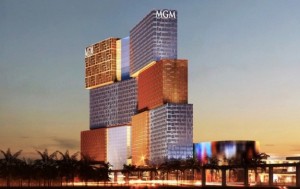Investor Jonathan Litt‘s proposed conversion of MGM Resorts International isn’t just another random case of REITmania. According to Forbes, MGM is expected to return to  profitability this year and “some of those expected profits will leak into government coffers.” REITs are tax-exempt, which is what’s making them so sexy to the gaming sector right now. One of the planks in Litt’s platform is asset sales and not even Macao is sacred. According to a statement release from his Land & Buildings fund, “spinning out or monetizing MGM China would focus investors on attractive domestic trends.”
profitability this year and “some of those expected profits will leak into government coffers.” REITs are tax-exempt, which is what’s making them so sexy to the gaming sector right now. One of the planks in Litt’s platform is asset sales and not even Macao is sacred. According to a statement release from his Land & Buildings fund, “spinning out or monetizing MGM China would focus investors on attractive domestic trends.”
However, in Las Vegas Sands director Jason Ader Forbes has finally found someone who will address the elephant in the middle of the room: the imperative to return 90% of taxable earnings to shareholders. He told the magazine what you and I already know: “casinos are notoriously capital intensive businesses that might not be a great fit for REIT structures.” Or, in Ader’s own words, “it’s short-term financial alchemy that can create long-term problems.”
Throttling the capex budget in this fashion would be particularly problematic for MGM,  which has a raft of capital-intensive projects in train, including MGM Cotai (above), MGM Springfield (left) and MGM National Harbor. Besides, maintaining a slew of high-end hotels on the Las Vegas Strip doesn’t come cheap. Ader also sees a pitfall in putting an arms-length relationship between MGM’s properties and their management. As Forbes puts it, “a lodging business separated from its real estate and paying occupancy costs might need to negotiate hard on rents and capital plans to find spending room.”
which has a raft of capital-intensive projects in train, including MGM Cotai (above), MGM Springfield (left) and MGM National Harbor. Besides, maintaining a slew of high-end hotels on the Las Vegas Strip doesn’t come cheap. Ader also sees a pitfall in putting an arms-length relationship between MGM’s properties and their management. As Forbes puts it, “a lodging business separated from its real estate and paying occupancy costs might need to negotiate hard on rents and capital plans to find spending room.”
Land & Buildings has handwaved away such concerns. That may be one of the many reasons that Wall Street analysts put little stock (pun intended) in Litt’s attempt to force CEO Jim Murren‘s hand.
* By repealing state laws pertaining to sports betting, is New Jersey trying to institute sports betting at racinos and casinos? That’s the argument made to the Third Circuit Court of Appeals by NCAA and major-league sports attorney Paul Clement. It’s also a  line of reasoning called “Orwellian” by former U.S. Solicitor General Ted Olson (representing the Garden State) because it stands the state’s action on its head. Yesterday was the much-anticipated Third Circuit throwdown between the major leagues and New Jersey, with high-powered legal talent in each corner.
line of reasoning called “Orwellian” by former U.S. Solicitor General Ted Olson (representing the Garden State) because it stands the state’s action on its head. Yesterday was the much-anticipated Third Circuit throwdown between the major leagues and New Jersey, with high-powered legal talent in each corner.
The Third Circuit had visited this question earlier, when sports betting was explicitly legal, and opened a loophole that racetrack Monmouth Park is trying to exploit. Invoking that noted jurist Dr. Seuss, legislative emissary Michael Griffinger said, “I want to channel Horton Hears a Who: ‘I meant what I said, and I said what I meant’: We followed your guidance 100%.”
“This doesn’t mean that Monmouth Park will be the Wild, Wild West of sports betting,” said track attorney Ron Riccio, trying to make the case that the tracks can police themselves. Despite some expression of skepticism, Judge Julio Fuentes concluded, “Laissez faire, no licensing whatsoever. I guess it’s not for us to say if that’s good or bad,” gladdening the hearts of free-market theorists everywhere. Now that arguments have been heard, the court will keep us on tenterhooks, not rendering an opinion until May.
* “Following the tremendous losses of Hurricanes Katrina and Rita in 2005, insurance companies quit offering policies in counties located on the hurricane-prone Texas Gulf  coast. Instead the homeowner’s only option was to purchase insurance through the high-risk pool system offered by [Texas Windstorm Insurance Association]. Since 2008’s Hurricane Ike hit the Gulf Coast with such severity and monetarily devastated the fund, TWIA is operating with a huge deficit. It was nearly $137 million short in 2013,” said Texas state Rep. Joe Deshotel (D, left).
coast. Instead the homeowner’s only option was to purchase insurance through the high-risk pool system offered by [Texas Windstorm Insurance Association]. Since 2008’s Hurricane Ike hit the Gulf Coast with such severity and monetarily devastated the fund, TWIA is operating with a huge deficit. It was nearly $137 million short in 2013,” said Texas state Rep. Joe Deshotel (D, left).
What’s that got to do with gambling? It’s Deshotel’s rationale for introducing a bill to legalize casino gambling in Texas. The booty would come with some geographic constraints. “Full Las Vegas-style casinos will be permitted within a first-tier coastal county or second-tier county or in a county where its county seat is within 100 miles from a first- or second-tier county,” Deshotel told the Houston Chronicle. No need for Las Vegas Sands to fuel the corporate jet and fly Sheldon Adelson to Austin just yet: Deshotel has no House co-sponsors and no Senate sponsors for his bill, which must be eventually passed by voters as a constitutional amendment to become law. For the moment, he’s a lone wolf prowling the Lege in search of votes.


Hey Dave, The Texas Lege has no time for gambling. Those morons are too busy thinking about guns and dumbing down our high school seniors. The headlines I woke up to are “Senate plan would let thousands of high school seniors graduate without passing test”. As a born and raised Texan I am embarrassed. Gambling in Texas? Never!! Gun toting knuckleheads? Everywhere!!
Ader has a good point. My argument against has always been that you lose control of a fundamental part of your business and that is the building and land itself. Imagine when your leases come due what kind of squeeze GPLI would put on you?
On the other hand, the hotel industry has done this quite successfully. With casinos now or coming to a community near you perhaps the gaming industry is morphing into more of the hotel industry … which it broke away from years ago.